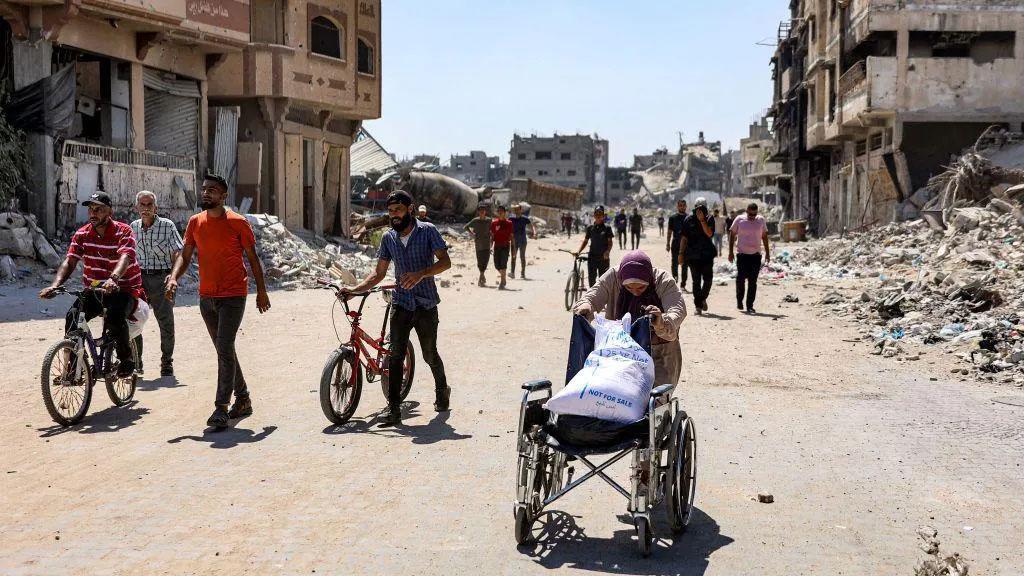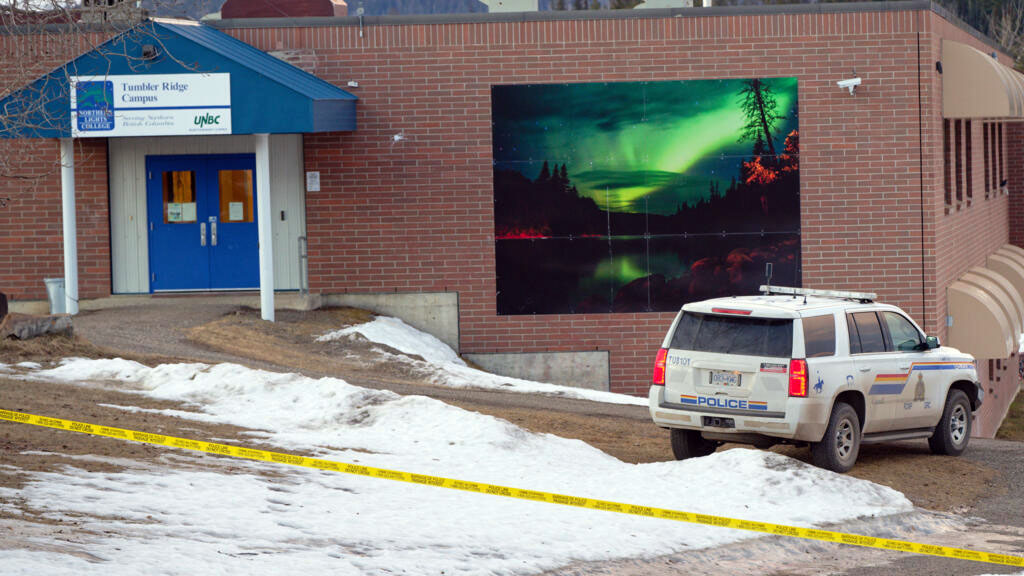International
Israeli forces bombard Gaza City as tanks re-enter central areas

Israeli forces bombard Gaza City as tanks re-enter central areas
Palestinians in Gaza City say they have experienced one of the most intense Israeli bombardments since Israel launched its war on Hamas after the group’s unprecedented 7 October attack.
Columns of Israeli tanks are reported to be closing in on the centre of the city from several different directions.
The Gaza Civil Emergency Service says it believes a number of people have been killed but has so far been unable to reach them because of fighting in several districts in the east and west of Gaza City.
The Al-Ahli Baptist hospital is reported to have been evacuated, with its patients being taken to one of the only medical facilities still functioning in the area – the already overcrowded Indonesian hospital.
Meanwhile, a senior Palestinian official has told the BBC that indirect negotiations between Hamas and Israel on a ceasefire and hostage release deal are expected to resume in Qatar within 48 hours.
A preliminary meeting would take place in Egypt on Monday between US, Israeli and Egyptian intelligence chiefs, the official said.
Ahead of the assault in Gaza City, the Israel Defense Forces (IDF) issued evacuation orders for several neighbourhoods in the centre, including Tuffah, Daraj and the Old City.
But one of the areas that has come under the most intense assault, Tel al-Hawa, was not included in the evacuation order that was posted online with a map by the IDF Arabic spokesperson on Sunday.
On Monday afternoon, the IDF issued a new order that covered Tel al-Hawa as well as the Sabra and al-Rimal areas, to the north and west.
READ ALSO:
- FG exempts GenCos, DisCos, others from withholding tax
- Missing UNN Level-one student found dead on campus
- Police arrest Kwara ritualist attempting to slit teenage hawker’s throat
One resident of Gaza City, Abdel Ghani asked: “The enemy is behind us and the sea is in front of us, where shall we go?”
Others have also told the BBC that they do not know where to go. They say that only one route remains – to go north towards the port area of Gaza City.
Some fled districts after receiving an evacuation order, only to find that the area they moved to was coming under Israeli bombardment.
In al-Rimal, a freelance cameraman working for the BBC says that he did not receive any evacuation orders, but later learnt that his neighbour did.
He left the area with his family and headed north. They are now in the port area but lack basic necessities. He says he is struggling to find water for his children.
In a statement, the IDF confirmed that it launched what it called a new operation in Tel al-Halwa overnight, following what it said was intelligence of Hamas and Palestinian Islamic Jihad infrastructure and fighters in the area.
The military also said that it was operating at the headquarters of the UN agency for Palestinian refugees, Unrwa, in the area.
The IDF said that at the start of the operation, it gave warnings to civilians – and it said that it would open up a humanitarian corridor for people to leave the area.
The latest Israeli offensive in Gaza comes as hopes have been rising that a ceasefire deal might finally be agreed.
READ ALSO:
- Police link three workers of Lebanese company to Fouani kidnap
- Factional NNPP NEC insists Kano gov remains suspended for six months
- Dozens killed again in Gaza as war enters 10th month
A senior Palestinian official familiar with the talks has told the BBC that indirect negotiations between the Hamas and Israeli negotiating teams, mediated by Qatar and Egypt, will start in Doha within the next 48 hours.
The official also said a preparatory meeting was due to take place in Cairo on Monday between CIA director William Burns, the head of Israel’s Mossad intelligence agency, David Barnea, and the head of Egyptian Intelligence, Abbas Kamel.
The three intelligence chiefs are then all due to travel to Doha on Tuesday.
The official outlined to the BBC several key sticking points from the Hamas perspective:
- Hamas wants Israeli forces to withdraw from both the Rafah crossing with Egypt and the Philadelphi corridor, a strip of land running along the Egyptian border
- Israel has vetoed Hamas’s demand for release from Israeli prisons of 100 senior figures from the Palestinian Islamic Jihad and Fatah political factions
Hamas’s negotiating team has already dropped its requirement for Israel to accept a permanent ceasefire as a precondition for any potential deal.
The official said the negotiating process would be very long and complex, but that there was some degree of hope that it might work this time.
On Sunday, a statement by the office of the Israeli Prime Minister, Benjamin Netanyahu, may have somewhat dampened expectations by insisting that any deal must not stop Israel from resuming fighting in Gaza until its war objectives are met.
Mr Netanyahu has repeatedly defined those aims as being the eradication of Hamas, both militarily and politically.
Israeli forces bombard Gaza City as tanks re-enter central areas
BBC
International
Trump Halts Minnesota Immigration Crackdown After Fatal Shootings, Protests

Trump Halts Minnesota Immigration Crackdown After Fatal Shootings, Protests
The Trump administration has officially halted Operation Metro Surge, a controversial immigration enforcement operation in Minnesota, following widespread protests, political backlash, and the deaths of two U.S. citizens. The decision was announced by Tom Homan, the U.S. “border czar,” who confirmed that President Donald Trump approved ending the monthslong crackdown.
Operation Metro Surge, launched in December 2025, focused on the Minneapolis–St. Paul metropolitan area, deploying nearly 3,000 federal immigration officers at its peak. The operation aimed to detain undocumented immigrants, which the Department of Homeland Security (DHS) described as targeting “criminal illegal aliens.” However, reports indicate that many detainees had no criminal records, including children and U.S. citizens, raising concerns about the operation’s scope and fairness.
- Army University Professor Dies in Boko Haram Captivity After Nearly One Year
- MURIC Calls Proposed US Sanctions on Nigerian Muslims ‘Lopsided’
- Supreme Court Affirms Muslim Students’ Right to Worship at Rivers State University
The crackdown drew intense public opposition after anti-ICE protesters Renée Good and Alex Pretti were fatally shot during separate incidents in Minneapolis. The shootings intensified calls for accountability and prompted local and national criticism of federal enforcement tactics.
In a statement, Homan said, “I have proposed and President Trump has concurred that this surge operation conclude.” He noted that a drawdown of federal personnel had already begun, with a smaller contingent remaining temporarily to transition operations and coordinate with local authorities.
During the operation, DHS reported over 4,000 arrests, though critics highlighted the disproportionate impact on communities and families, emphasizing the humanitarian and civil liberties concerns arising from the surge.
Minnesota officials, including Governor Tim Walz and Minneapolis Mayor Jacob Frey, welcomed the decision, calling the operation an overreach that harmed communities and strained trust between law enforcement and residents. Civil rights groups also praised the halt but urged comprehensive immigration reforms to prevent future abuses.
The end of Operation Metro Surge marks a significant development in the national debate over immigration enforcement, sanctuary policies, and federal authority, highlighting the challenge of balancing border security with human rights and community safety.
Trump Halts Minnesota Immigration Crackdown After Fatal Shootings, Protests
International
Russia Escalates Digital Control with Attempted WhatsApp Block

Russia Escalates Digital Control with Attempted WhatsApp Block
WhatsApp has accused the Russian government of trying to completely block its messaging service in the country, a move aimed at steering users toward the state-backed app MAX. The Meta-owned platform said the effort, reported on February 12, 2026, threatens over 100 million users and undermines private, encrypted communication in Russia.
In a statement, WhatsApp said: “Today the Russian government attempted to fully block WhatsApp in an effort to drive people to a state-owned surveillance app. Trying to isolate over 100 million users from private and secure communication … can only lead to less safety for people in Russia. We continue to do everything we can to keep users connected.”
READ ALSO:
- Tumbler Ridge Massacre: Canada Investigates Shooter’s Mental Health, Police History
- Ex-Acting AGF Nwabuoku Admits Diverting N868.4 Million to Private Firms
- Kwankwasiyya Urges US Congress to Drop Kwankwaso’s Name from Bill
The attempt is part of a broader crackdown on foreign tech platforms in Russia. Authorities have previously restricted access to Facebook, Instagram, and targeted other services like Telegram. Reports indicate that Roskomnadzor, Russia’s communications regulator, removed WhatsApp from its national internet directory, forcing users to rely on VPNs to access the platform. Critics warn that such measures are designed to expand state surveillance and control over digital communication.
The government is actively promoting MAX, a domestic “super-app” similar to China’s WeChat, which combines messaging with other services. Rights advocates caution that the push toward MAX could compromise privacy protections that platforms like WhatsApp provide. Meanwhile, Kremlin officials have indicated that WhatsApp and other restricted apps could be restored if Meta complies with local data storage and regulatory laws.
WhatsApp’s statement emphasizes that the company will continue to work to keep its service accessible where possible, but the attempted block highlights Russia’s ongoing effort to enforce digital sovereignty and shift users toward state-controlled technology platforms.
Russia Escalates Digital Control with Attempted WhatsApp Block
International
Tumbler Ridge Massacre: Canada Investigates Shooter’s Mental Health, Police History

Tumbler Ridge Massacre: Canada Investigates Shooter’s Mental Health, Police History
Canadian authorities are intensifying investigations into the mental health history and prior police interactions of Jesse Van Rootselaar, the 18-year-old who carried out a deadly mass shooting in the remote mining town of Tumbler Ridge, British Columbia, on February 10, 2026. The tragedy has left the small community in mourning and raised national questions about gun control, mental health support, and law enforcement interventions.
According to RCMP Deputy Commissioner Dwayne McDonald, authorities are still unclear on the motive behind the attack, which is one of the deadliest school shootings in Canadian history. Van Rootselaar, a transgender woman who had dropped out of Tumbler Ridge Secondary School four years ago, first killed her mother and stepbrother before opening fire at the school, where she shot six more victims. The shooter later took her own life at the scene.
Investigators have confirmed that Van Rootselaar was known to police and had previous interactions with the public health system due to mental health concerns. Authorities are reviewing prior incidents, including earlier firearms seizures and her lapsed gun licence, to understand how warning signs were addressed before the massacre. British Columbia Premier David Eby said officials are working with the health system to determine “what interactions may have taken place” in the past.
READ ALSO:
- Ex-Acting AGF Nwabuoku Admits Diverting N868.4 Million to Private Firms
- Kwankwasiyya Urges US Congress to Drop Kwankwaso’s Name from Bill
- Liverpool Edge Sunderland 1-0 to Halt Impressive Home Streak
The victims include a 39-year-old female teacher and five students aged 12 and 13, with one child, 12-year-old Maya Gebala, in critical condition after trying to lock herself and classmates in a library during the attack. First responders arrived within minutes, but the scale of the violence left the tight-knit community of about 2,700 residents reeling. Hundreds gathered for a candlelight vigil to honour those killed and injured.
Prime Minister Mark Carney addressed parliament, describing Tumbler Ridge as a resilient, compassionate community of miners, teachers, and construction workers, and emphasised the need to learn from the tragedy. Flags across Canada have been lowered to half-staff for seven days in remembrance of the victims. Britain’s King Charles and Queen Camilla also expressed shock and sorrow over the massacre.
Schools in the area will remain closed for the remainder of the week as authorities continue their investigation into Van Rootselaar’s mental health background, police interactions, and access to firearms, seeking to understand how similar tragedies can be prevented in the future.
Tumbler Ridge Massacre: Canada Investigates Shooter’s Mental Health, Police History
-

 metro2 days ago
metro2 days agoIKEDC Sets Feb 20 Deadline for Customers to Submit Valid IDs or Face Disconnection
-

 Education3 days ago
Education3 days agoSupreme Court Affirms Muslim Students’ Right to Worship at Rivers State University
-

 metro2 days ago
metro2 days agoLagos Police Launch Manhunt for Suspect in Brutal Ajah Murder
-

 News2 days ago
News2 days agoAso Rock Goes Solar as Tinubu Orders National Grid Disconnection
-

 Business3 days ago
Business3 days agoNaira Could Trade Below ₦1,000/$ With Dangote Refinery at Full Capacity — Otedola
-

 metro2 days ago
metro2 days agoArmy University Professor Dies in Boko Haram Captivity After Nearly One Year
-

 International2 days ago
International2 days agoTrump Halts Minnesota Immigration Crackdown After Fatal Shootings, Protests
-

 Politics3 days ago
Politics3 days agoCity Boy Movement Receives Bus Donations from Zenco, Obi Cubana for Tinubu’s Campaign















